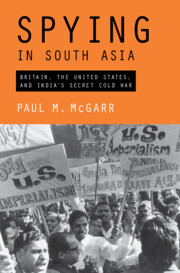Book contents
- Spying in South Asia
- Spying in South Asia
- Copyright page
- Contents
- Figures
- Acknowledgements
- A Note on Place Names
- Abbreviations
- Introduction
- 1 Transfer of Power: British Intelligence and the End of Empire in South Asia
- 2 Silent Partners: Britain, India, and Early Cold War Intelligence Liaison
- 3 India’s Rasputin: V. K. Krishna Menon and the Spectre of Indian Communism
- 4 Quiet Americans: The CIA and the Onset of the Cold War in South Asia
- 5 Confronting China: The Sino-Indian War and Collaborative Covert Action
- 6 Peddling Propaganda: The Information Research Department and India
- 7 From Russia with Love: Dissidents and Defectors in Cold War India
- 8 The Foreign Hand: Indira Gandhi and the Politics of Intelligence
- 9 Battle of the Books: Daniel Patrick Moynihan, Seymour Hersh, and India’s CIA ‘Agents’
- 10 Indian Intelligence and the End of the Cold War
- Conclusion
- Notes
- Bibliography
- Index
10 - Indian Intelligence and the End of the Cold War
Published online by Cambridge University Press: aN Invalid Date NaN
- Spying in South Asia
- Spying in South Asia
- Copyright page
- Contents
- Figures
- Acknowledgements
- A Note on Place Names
- Abbreviations
- Introduction
- 1 Transfer of Power: British Intelligence and the End of Empire in South Asia
- 2 Silent Partners: Britain, India, and Early Cold War Intelligence Liaison
- 3 India’s Rasputin: V. K. Krishna Menon and the Spectre of Indian Communism
- 4 Quiet Americans: The CIA and the Onset of the Cold War in South Asia
- 5 Confronting China: The Sino-Indian War and Collaborative Covert Action
- 6 Peddling Propaganda: The Information Research Department and India
- 7 From Russia with Love: Dissidents and Defectors in Cold War India
- 8 The Foreign Hand: Indira Gandhi and the Politics of Intelligence
- 9 Battle of the Books: Daniel Patrick Moynihan, Seymour Hersh, and India’s CIA ‘Agents’
- 10 Indian Intelligence and the End of the Cold War
- Conclusion
- Notes
- Bibliography
- Index
Summary
The CIA remained a fixture at the heart of Indian civil debate throughout the 1980s. To the very end of the Cold War, the political fortunes of Indira Gandhi, and her son, and successor, Rajiv Gandhi, were intertwined with a series of espionage scandals in which, almost inevitably, the CIA figured prominently. This chapter examines the Reagan administration’s reliance of the CIA as a cold war foreign policy tool and its difficulties in securing Indian support to counter what officials in Washington perceived to be an alarming and unacceptable expansion in Soviet disinformation activity in the subcontinent. It explores the assassinations of Indira and Rajiv Gandhi and how these two tragic events came to be connected by South Asians with the Agency and its earlier CIA involvement in subversion and political assassination in the Global South. As the Cold War approached its end, and Hindu nationalism, rampant corruption, and political violence gripped India, the chapter considers why national powerbrokers in the subcontinent were once again unable to resist urging citizens to ‘look the other way’ and attribute the country’s troubles to a ubiquitous foreign hand?
Keywords
- Type
- Chapter
- Information
- Spying in South AsiaBritain, the United States, and India's Secret Cold War, pp. 233 - 256Publisher: Cambridge University PressPrint publication year: 2024



